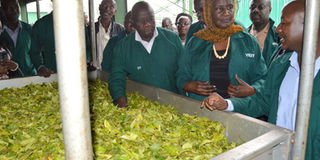Supply-chain issues slow agro-processing efforts

Trade minister, Amelia Kyambadde (2nd Right) tours one of the tea processing factories in Western Uganda supported by Uganda Development Corporation, an agency under her docket. PHOTO BY ISMAIL MUSA LADU
What you need to know:
The biggest problem agro-processing factories face is shortage of key raw materials, Ismail Musa Ladu writes.
Government’s effort to establish industries in several parts of the country is being threatened by supply constraints, Daily Monitor has learnt. If these are not swiftly solved, it is likely that the government investment in these ventures will go down the drain.
Shortage
During the monitoring visit of the three industrialisation projects in Western Uganda by the trade minister, Amelia Kyambadde recently, it emerged that one of the biggest problems agro-processing factories face is shortage of key raw materials.
This was evident in the two tea factories Ms Kyambadde visited in Kabale and Kisoro districts and a fruit factory in Isingiro district.
As a result, she feared that the government’s support towards these industries created across four regions of the country may not achieve the desired results if the farmers are missing in the supply value chain.
Although there is some progress, she noted some prevailing supply side challenges which the processing plants are grappling with.
“It has come to my notice that there is insufficient supply of raw material (tea leaves) to the factories,” she said in an interview after the tour of the factories.
Ms Kyambadde said the National Agricultural Advisory Services (NAADS) and its mother ministry needs to play more proactive role so should the local government.
She suggested that this situation can be overturned if ministries, departments and agencies (MDA) all coordinate their effort.
While in Cabinet, she said she will raise it out with her colleagues at that level, including discussing other infrastructural issues such as power and roads which came up prominently, in addition to allegations over corruption and mismanagement surrounding the procurement of tea leaves from farmers.
Through the Uganda Development Corporation (UDC), several industries have been supported. UDC established two tea factories in western Uganda at a combined cost of Shs9.1b after securing cabinet approval in 2014.
The move is part of government’s plan to promote value addition in an attempt to align the agro sector to the National Export Development Strategy and National Development Plan II.
Tea is earmarked as one of the priority and strategic commodities in the agricultural sector, which according to Ms Kyambadde, will not only propel the sub-sector but also result into increased export of processed leaf.
Coordination
Dr Ramathan Ggoobi, an economist and UDC board member, in an interview said the supply chain issues can be solved once government enforces coordination of the industry supply value chain players. This, he said, begins with coordination of MDAs who in turn will ensure a levelled playing field among those involved in the supply value chains, including farmers who are the suppliers of tea leaves.
The factories, once fully operational, according to the Ministry of Trade, will produce a combined total of 2,400 metric tonnes of ready-made tea per year worth $4.8m in export earnings.
Uganda, according to the Ministry of Trade, produces 61,629 metric tonnes of tea annually with 90 per cent of this exported through the Mombasa Tea Auction. The tea exports are valued $80.6m (Shs301.8b).




